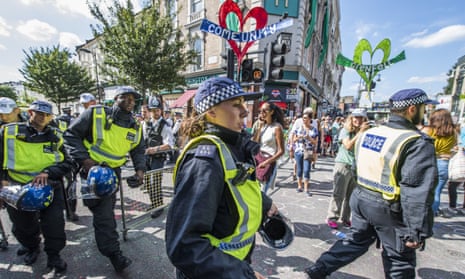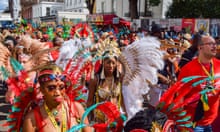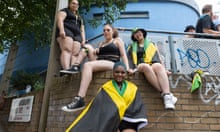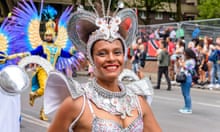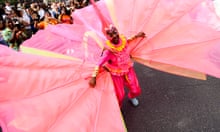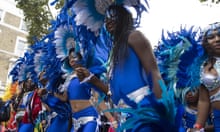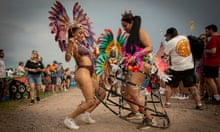Police at this year’s Notting Hill carnival will deploy metal-detecting knife arches and behavioural experts to try to thwart violence, but have dropped “Big Brother-style” facial recognition amid claims it was racially discriminatory and confused men with women.
Up to 1 million people are expected to attend this weekend’s west London event that is the biggest celebration of British African-Caribbean culture and seen by the Metropolitan police as the biggest public order challenge of the year.
Police hopes that cutting-edge facial recognition technology could boost their ability to catch criminals among the carnival crowds have been dashed. It was trialled at the last two carnivals but led to claims it was discriminatory and ineffective.
One independent observer of last year’s trial, from the human rights group Liberty, told the Guardian that the system, which links cameras to databases of suspects, in one instance matched a young woman to a balding man. It also confused genders on a second occasion.
This year, amid rising violence on Britain’s streets, the Met will go back to old technology used in new ways. As well as knife arches, they will deploy super-recognisers – officers with exceptional memories who can spot suspects in crowds from faces they have memorised.
It will be the first time knife arches have been used at the carnival, and covert officers trained in behavioural detection techniques will be used alongside them to try to spot suspicious behaviour.
Supt Elisabeth Chapple, of the Met, said: “There will be officers, including plainclothes officers, in areas where we have knife arches looking at any suspicious behaviours that would mean that a conversation needs to be had.”
Those refusing to go through the knife arch, which is voluntary, may be liable to then be stopped and searched, but Chapple said the main purpose was to deter people from carrying knives, catching those who try, and reassuring the public police were taking robust action.
Former Met superintendent Leroy Logan, was sceptical of the tactic: “Search arches have limited impact because the people that carry the knives get around them quite easily. They can get younger people to carry them or secrete the weapons around the area beforehand, in lift shafts, small ditches in parks, even chimneys,” he said. “I don’t think its going to be practical – there are so many ways to get into carnival.”
Carnival is more poignant this year after the Windrush scandal jolted Britain’s African-Caribbean communities and their sense of belonging.
But the cultural showcase is marred by fears of violence. Police said they were watching out for any attempt to use acid as a weapon, after a threat on social media. Barriers will also be used to thwart any terrorist attack using a vehicle, following a spate of such incidents over the last 18 months in Europe and Britain, motivated by jihadist and extreme rightwing ideologies.
Years of tighter restrictions on revellers and earlier finishes, in efforts to minimise crime, have caused frustration among carnival fans. Michael La Rose of Reclaim Our Carnival, said: “We’re not happy with the police’s attitude because the times they have met the public they have been unwilling to listen or change their position.
“We’ve been complaining about the style of policing, about them not being sensitive to it being a cultural occasion and not a public order situation. They make it seem like a crime haven compared to other festivals where there are drugs and violence, such as Reading and Glastonbury.”
Hannah Couchman, advocacy officer at Liberty, welcomed the decision not to use facial recognition, and said: “Using facial recognition two years running at the carnival was clearly an example of disproportionate targeting of BAME [black and minority ethnic] communities. We’re glad the Met thought better of deploying it this year.”
Matthew Phillip, the executive director of the carnival, said more community stewards would be used this year. He said: “At major junctions and entry points it will be community stewards doing that, not the police. They understand what carnival is, that will achieve a totally different atmosphere. Carnival is not a public order problem, it is a festival to unite people.”
Chapple said police were finding that using older technologies in new ways was proving as effective as facial recognition. Super-recognisers will also watch banks of screens in a control room showing CCTV footage of crowds so suspects can be spotted.
About 13,000 officers will be deployed across the two days of carnival, on Sunday and Monday.
For all the 12 months of planning by police, the best help they could get could be a forecast for rain on Sunday and, on Monday, cooler temperatures than recently enjoyed.
